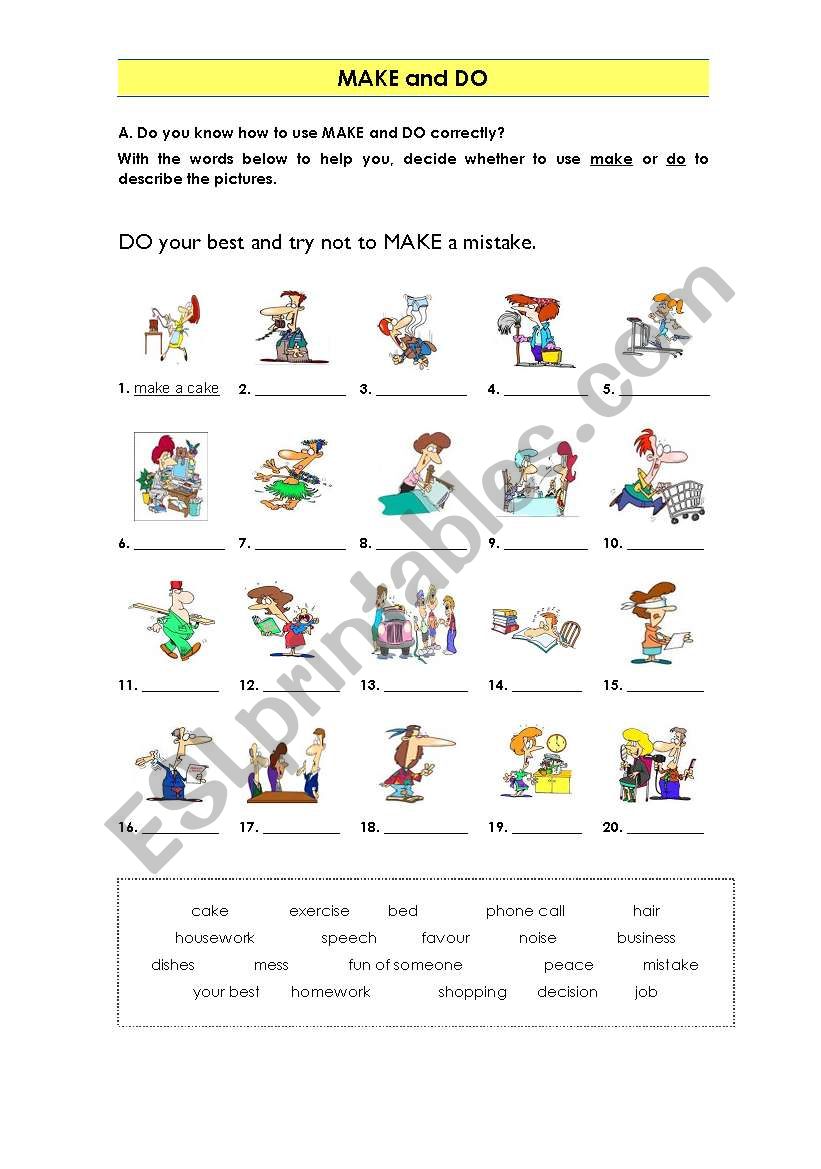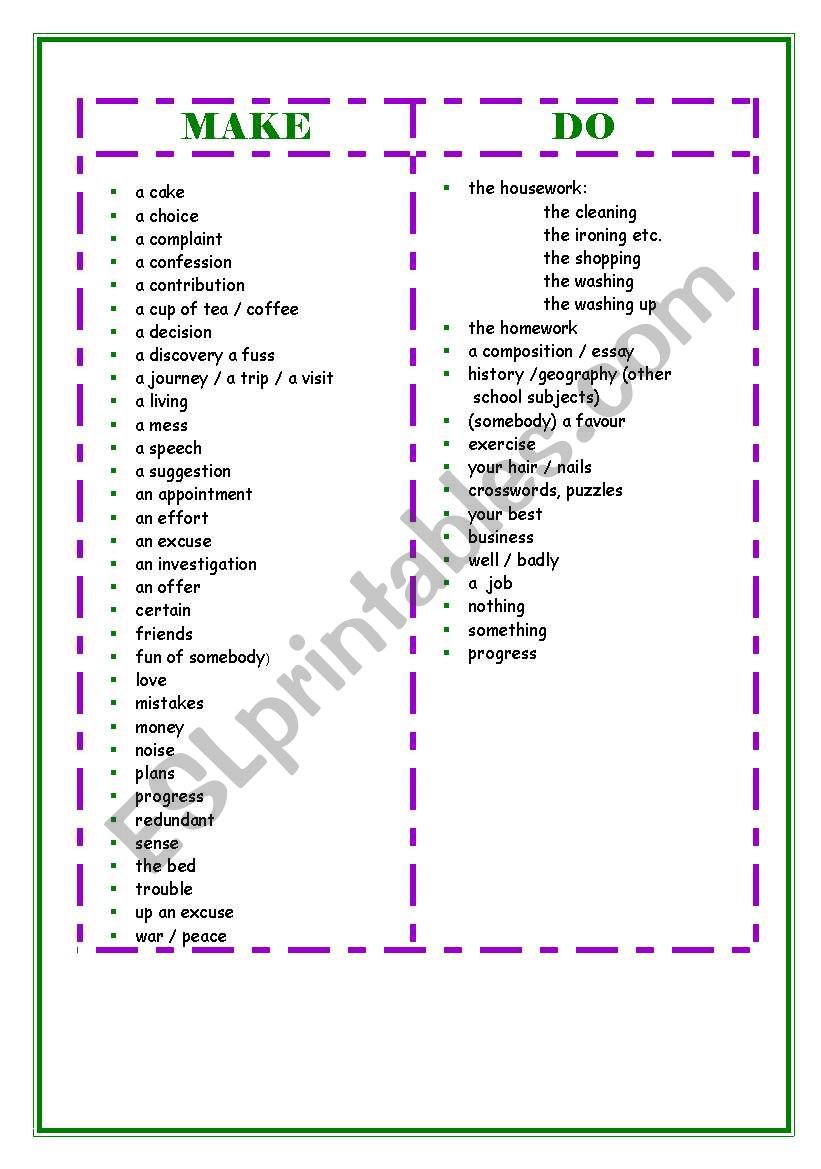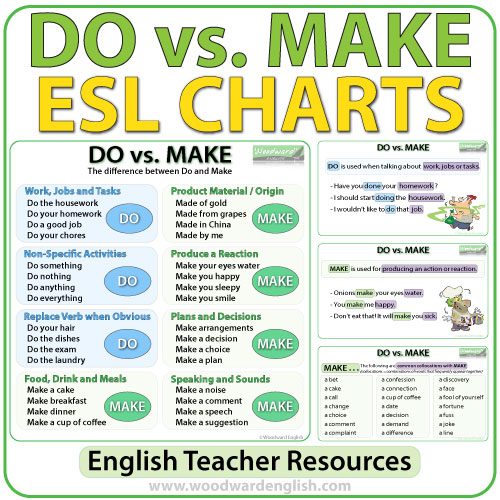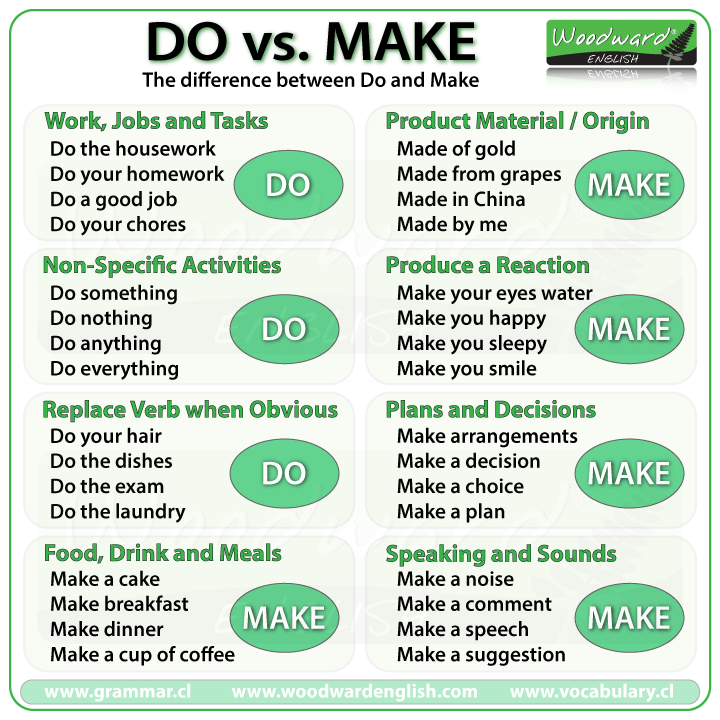Make or Do collocations general gr… English ESL worksheets pdf & doc

Do vs. Make Difference between Do and Make in English Effortless English
The Make-Do English worksheet may be used in a classroom setting or as part of self-study. It can be used with students at various levels of proficiency, from beginners to advanced learners. The worksheets typically include a series of prompts or questions that guide students through the creation of a dialogue or role-play scenario.

Do vs Make grammar guide English ESL powerpoints
TPR Make & Do flashcards. The objective of this worksheet is to teach students which words o with make and which words o with do. Cut the balls out and laminate. Do the same with the gloves.. A short grammar guide and three exercises to practise common collocations with make, do, have and take. B&W version and KEY included.

MAKE or DO collocations general voca… English ESL worksheets pdf & doc
'Make' means to create something and/or produce a result. If you make a shopping list, make dinner, or make a presentation, then you create something; there's a result at the end of the process. That's the basic difference between 'do' and 'make'. In the rest of this lesson from Oxford Online English, you'll learn about how to.

Make & Do Exercises general grammar… English ESL worksheets pdf & doc
edalloway. Make vs. Do. A worksheet with illustrations to practice when to use "make" and when to use "do". Drawings usually help students to memorize! 332 uses. ilviapiteri1234. Make vs Do. This is a worksheet done for those students who find a difficulty and get puzzled when choosing between do and make.

Make & Do general grammar practice English ESL worksheets pdf & doc
Make or do? - exercise 1 Make or do? - exercise 2 Make or do? - exercise 3 Make vs do - test 1 Make vs do - test 2 Make vs do - test 3 Make / do - write Make or do? - quiz Make / do - write 2 Do vs make - verbs exercises Do this quiz. Make no mistakes Do vs make Do / have / make / take Make or do - right answer 3 Make or do - right answer 4

the differences between do and make
The verbs make, do and take often cause problems for learners of English. Unfortunately, there are no hard and fast rules to learn the difference, so the best way to learn these verbs is in context with nouns or as set phrases. Read on to learn when to use make, do and take in English, then put your knowledge to the test in the free exercises.

Do and make collocations general voc… English ESL worksheets pdf & doc
`To make' something is to create something. Something wasn't there, and then you made it. For example, you make a mistake. There was no mistake and then you created it; you made it. To make is to create something that did not exist before. The children made a mess. Common Expressions with the Verb Make You make… an excuse friends plans a joke

Make vs. Do English ESL worksheets pdf & doc
Make or do Share Level: Intermediate (B1-B2) Type of English: General English Tags: confusing words Vocabulary lesson Publication date: 19/02/2014 This worksheet looks at the differences between the verbs 'make' and 'do'. The lesson rounds off with a video-aided activity in which students describe different video clips using the target language.

Make / Do ESL worksheet by soniaa
Make / do Write: make or do -Can you dinner this evening? -I must some laundry . -Do you think we ought to something? -I'm going to a cake for my birthday. -I want to a shopping list. -What do you want to for fun? -I need to some research. Could you a restaurant reservation? -Can you me a favour? -I need to some cleaning.

MakeDo ESL worksheet by eduran
MAKE vs DO: When to use these verbs. Unfortunately, there is no hard and fast rule in English concerning the use of make and do. In general, however, we use 'make ' when we build, construct or create something and ' do ' for tasks and activities. MAKE : ' Make ' is used to talk about producing, constructing, creating or building something new.

DO vs. MAKE ESL Charts Woodward English
Perfect English Grammar It can be hard to decide when to use 'make' or 'do' in English. Here's some help. 1: We use 'make' when we create or construct something. For example: She made a cake. I've made us some coffee. Did you really make those trousers? 2: We use 'do' for general activities.

Verbs make / do Palabras de vocabulario, Vocabulario en ingles, Expresiones en ingles
1mada Make or Do - colloca It´s a matching exer 10477 uses jannabanna MAKE or DO collocati This ESL/EFL workshe 7882 uses rmartinandres COLLOCATIONS: MAKE O A pair of exercises 1080 uses seni77 MAKE or DO collocati In this ESL handout 866 uses anarti MAKE OR DO collocati Sometimes we make mi 855 uses

Make or Do multiple choice piction… English ESL worksheets pdf & doc
When we use do and make with noun phrases, do focuses on the process of acting or performing something, make emphasises more the product or outcome of an action: When I was [action] doing the calculations, I [outcome] made two mistakes. I [action] did some work for her last summer; I [outcome] made a pond in her garden.

MAKE & DO English ESL worksheets pdf & doc
Do it over when required. Do the report on time. Do is used to describe an activity that you have to do, often over and over again. For instance, we " do the dishes " and "do the laundry" many times. Do also contains an element of duty, obligation, and responsibility. Now, take a look at some expressions with "make".

DO vs. MAKE in English What is the difference? YouTube
Video: Make or do? The student watches a video explanation of differences in using make and do. They complete the video-related activities deciding on the correct use of these two verbs. The student puts their knowledge into practice by completing collocations and sentences with the correct forms of make and do.

DO vs MAKE The difference between Do and Make in English
We use "MAKE" for creating, producing and constructing. In other words, "MAKE" is often used when referring to the result. Do vs. Make: Definitions and Usages When it comes to distinguishing between "do" and "make," we often find ourselves confused, but with a few learning tips, we can master their usage. Let's break it down.